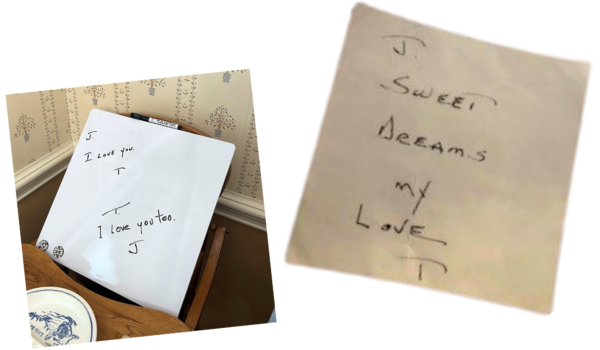1981-2001
Lauth joined the UGA Department of Political Science, teaching courses on state and local government and public budgeting and finance. He began publishing on these topics in high-impact journals, while distinguishing himself as a teacher, mentor, and all-around bastion of decency.
“Perhaps because of his blue-collar roots, Tom instinctively treated everyone he met with respect and dignity,” said John Maltese, now associate dean of SPIA. “He genuinely cared about people. That came across in his interactions with students, faculty, and staff. He got to know all of us as individuals, and we became part of his extended family.”
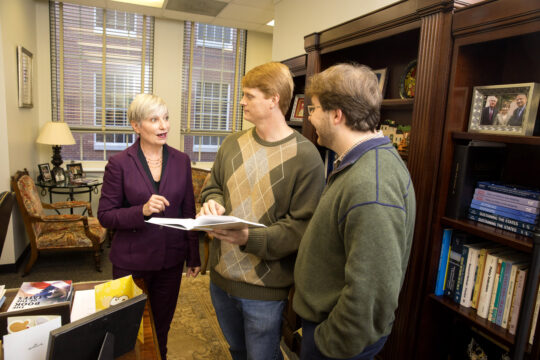 Lauth’s family didn’t stop there. Determined to identify applications of his research that would benefit the public, he forged connections with the heads of state agencies, creating a pipeline between theory and practice that benefited his research, his students, and the state of Georgia.
Lauth’s family didn’t stop there. Determined to identify applications of his research that would benefit the public, he forged connections with the heads of state agencies, creating a pipeline between theory and practice that benefited his research, his students, and the state of Georgia.
Professor Katherine Willoughby (UGA) met Lauth in 1984, when she joined the PhD program in public administration.
“He was just such a masterful teacher,” said Willoughby. “He always pushed us to be the best we could be, but in a quiet way. He never seemed to be worried or upset about anything, he was never pushy, and you never left his office feeling uneasy.”
Lauth mentored her, eventually chairing her dissertation committee. When she pitched her dissertation topic, the decision-making orientation of local government budget analysts, he invited her to think a bit bigger. He wrote to 10 state government budget officers in support of Willoughby’s study, securing her access, and supported her throughout the process. Her work won the NASPAA Dissertation Award in 1991.
“He had an extensive network and a direct line for providing feedback, analysis, and recommendations to state officials on running government,” she recalled. “His generosity and trust told me a lot and made me feel that much closer to him at that time.”
Many of those interviewed credited Lauth’s connections and recommendations for Georgia’s longtime financial security.
“Georgia’s AAA credit rating is one indication of a state well run and in relatively good fiscal health,” said Willoughby. “That has been a constant since Thomas began working in Georgia in the 1970s.”
“Georgia’s reputation for wise budgetary stewardship is attributable to Dean Lauth,” said Matthew Auer, current dean of the School of Public and International Affairs. “Tom taught countless students who became practicing state and local budget and finance experts in Georgia and beyond. Alumni and non-alumni alike sought his counsel on specific matters of revenue management – from the local to the federal level. Tom advised the Georgia legislature, too, on appropriations.”
These scholarly accomplishments won Lauth the rank of full professor in 1987, and he accepted the role of department head in 1988. As an administrator, he valued the camaraderie and comfort of the faculty under his guidance as much as their research productivity and teaching evaluations. When 28-year-old John Maltese arrived, Tom informed him of a pressing committee assignment.
“Having been told that junior faculty would be shielded from committee roles, I was a little surprised,” said Maltese. “But I said, ‘Of course. What’s the committee?’”
“‘The Libation Committee,’ he said. ‘It meets every Friday after work.’” Lauth’s happy hours convened junior and senior faculty; he came each week, but arrived late.
“At first, I thought it was because he had work to finish up,” said Maltese. “Eventually I realized that he wanted to give us space to unwind and gripe about things we might not want to say in front of the department head.”
“When he did arrive, you knew that this was a man who listened and cared—and who was fun to be with. Those happy hours quickly became the highlight of my week.”
“Tom dressed formally,” Maltese continued. “It was rare to see him without a coat and tie. But he wasn’t distant. No matter the occasion, he preferred to wear a blue shirt in honor of his working-class blue-collar roots in Pittsburgh, Pennsylvania.”
This humility appeared in every part in his life. He drove a 23-year-old sedan long into his tenure as dean.

“I think I forced him to get a new car,” said Jeannie. “I remember a faculty member came up to him [when he was appointed dean] and said, ‘I guess you will get a new car now.’ And Tom said, ‘Why?’”
Back home, the Lauths fell in love with international travel, initially as part of Jeannie’s career with American Express, in the wholesale travel division.
“After that, we traveled with Tom because he got involved in a lot of international professional organizations,” said Jeannie. “Not including Canada, we have taken 53 international trips. We loved it.”
Scrapbook after scrapbook recounts their adventures across Europe and Asia. In one photo, on one of eight trips to South Korea, Tom shakes the hand of a colleague at Konkuk University.
Jeannie smiled fondly. “The way [his associate] is looking at him, and Tom is looking back, it is as though he is the only person in the room,” she said. “He had that talent. He could speak to you and make you feel his interest in you and your story, whether you were instrumental to him or not.”
Some travel covered fewer miles, but had a greater impact. “As a very junior assistant professor, my mother died,” recalled Maltese. “To my great surprise, Tom showed up at her funeral in Alabama, quietly slipping into the back of the church. It was a three-hour drive each way for him, but that’s just what he did—quietly, genuinely, and without ostentation.”
In 1993, with all four sons having graduated from college and starting careers, the family moved to Athens, purchasing a peaceful home in the Five Points neighborhood. Lauth took particular pleasure in serving as an instructor for the UGA study abroad program in Verona, Italy, which he did from 1998-2001. In 1998, he received the Aaron B. Wildavsky Award for lifetime scholarly achievement from the Association of Budgeting and Financial Management.
As department head, Lauth played a heavy role in the creation of the UGA School of Public and International Affairs (SPIA). In 2001, as the culmination of years of planning, the UGA Department of Political Science, formerly in the Franklin College of Arts and Sciences, was reorganized as one of three departments in a new school of public affairs.

 1938-1956
1938-1956 “We lived in Decatur, in a tiny house,” Jeannie shared. “Our third son (John) was born there. People in Atlanta were so welcoming to us that we decided if we ever had the opportunity, we’d come back.”
“We lived in Decatur, in a tiny house,” Jeannie shared. “Our third son (John) was born there. People in Atlanta were so welcoming to us that we decided if we ever had the opportunity, we’d come back.” Lauth’s family didn’t stop there. Determined to identify applications of his research that would benefit the public, he forged connections with the heads of state agencies, creating a pipeline between theory and practice that benefited his research, his students, and the state of Georgia.
Lauth’s family didn’t stop there. Determined to identify applications of his research that would benefit the public, he forged connections with the heads of state agencies, creating a pipeline between theory and practice that benefited his research, his students, and the state of Georgia.
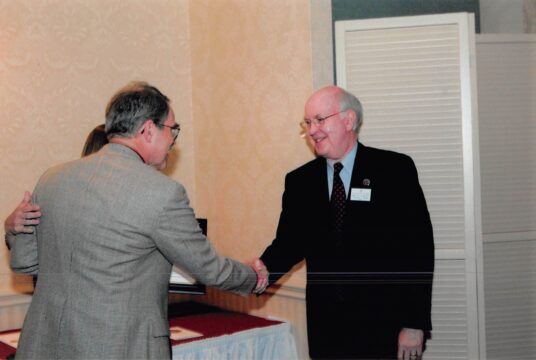 “Tom served in a professional and fair manner to all,” shared Geneva Foster, who worked as a student advisor and program coordinator. “He supported our personal needs as well, whether it was work, family, or a medical situation.” Pam Smith, the administrative assistant who worked beside him for 25 years, remembers kindness, brilliance, and dedication.
“Tom served in a professional and fair manner to all,” shared Geneva Foster, who worked as a student advisor and program coordinator. “He supported our personal needs as well, whether it was work, family, or a medical situation.” Pam Smith, the administrative assistant who worked beside him for 25 years, remembers kindness, brilliance, and dedication.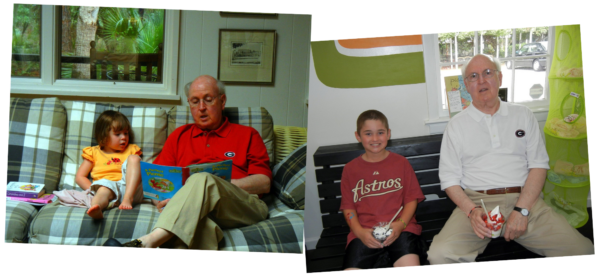
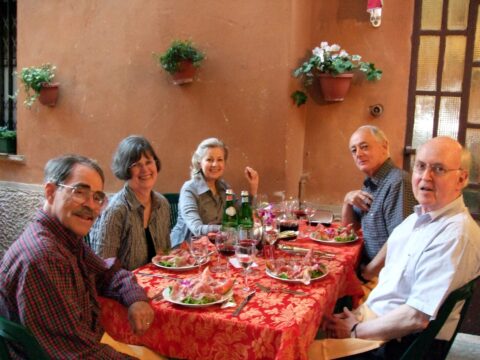
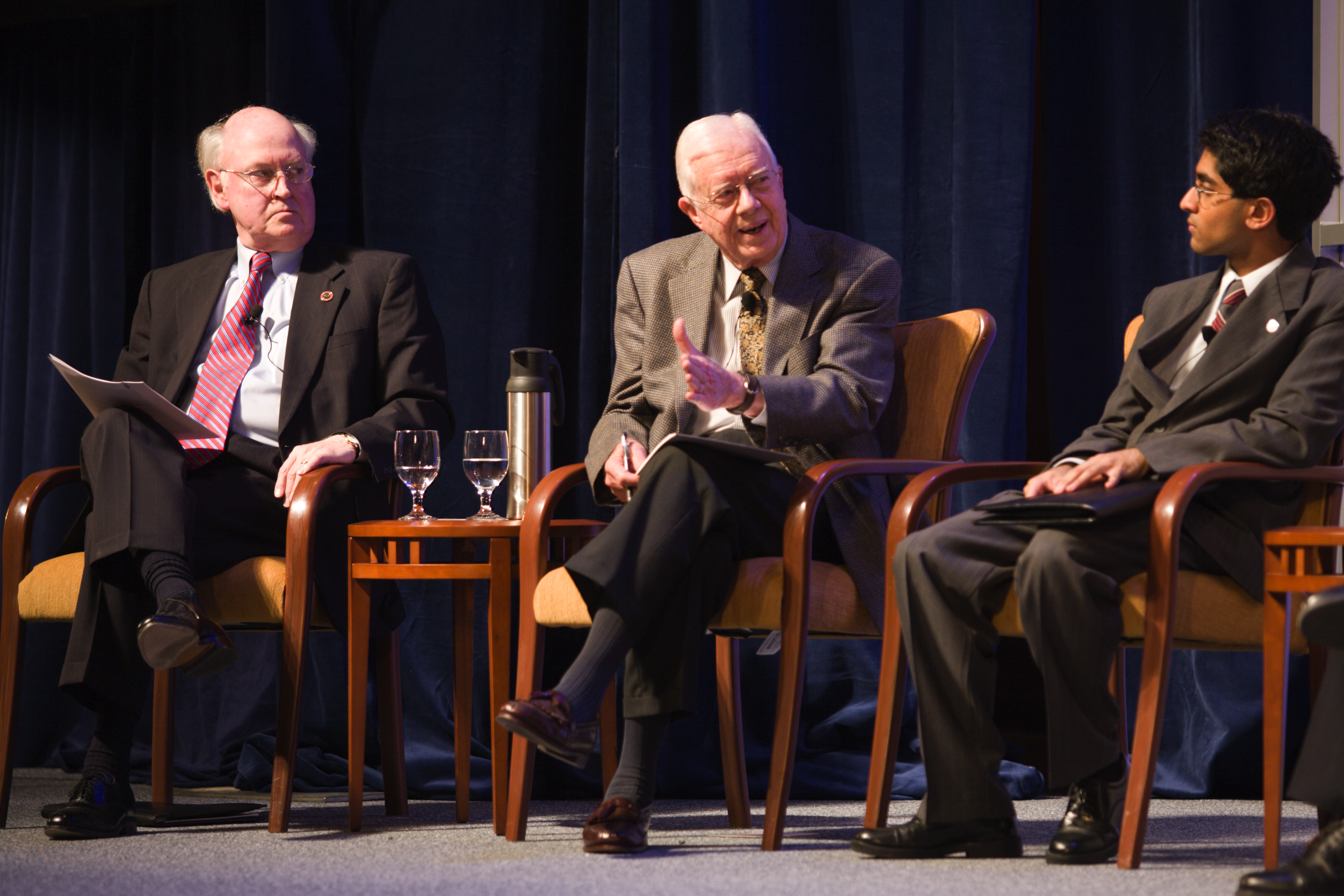


 When the pandemic hit, Lauth saw an opportunity to complete his own capstone project: a compilation of his life’s research dedicated to the state of Georgia. Over his career, he advised Georgia governors from Lester Maddox to Nathan Deal, and made recommendations that influenced budgetary decisions for each administration.
When the pandemic hit, Lauth saw an opportunity to complete his own capstone project: a compilation of his life’s research dedicated to the state of Georgia. Over his career, he advised Georgia governors from Lester Maddox to Nathan Deal, and made recommendations that influenced budgetary decisions for each administration.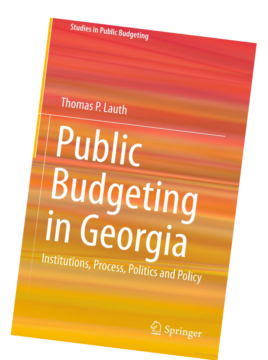
 “He was absolutely a rabid fan,” said Jeannie. “His Dad was a football referee and a goal judge for the local hockey team, so as an only child, he came to know sports really well.”
“He was absolutely a rabid fan,” said Jeannie. “His Dad was a football referee and a goal judge for the local hockey team, so as an only child, he came to know sports really well.”
